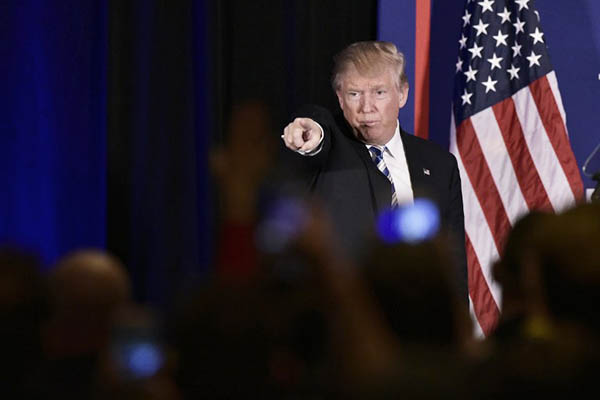
Mandel Ngan—AFP
U.S. president-elect’s view is marked departure from President Obama’s call for elimination of nuclear weapons.
America must massively boost its nuclear capability until the “world comes to its senses,” president-elect Donald Trump said on Thursday, hours after a similar vow by Russia’s Vladimir Putin.
Trump made the statement on Twitter, without providing details or context, a day after meeting a group of Pentagon top brass, and shortly after Putin called for Russia to reinforce its own nuclear capabilities. “The United States must greatly strengthen and expand its nuclear capability until such time as the world comes to its senses regarding nukes,” Trump tweeted.
The open talk of ramping up nuclear capabilities—reminiscent of Cold War pledges—marks a jarring departure from the stance of President Barack Obama, who in a famous speech in Prague in 2009 called for the elimination of nuclear weapons. In 2010, Obama and Russia’s then president Dmitry Medvedev signed the so-called New START treaty that calls for a significant reduction in the nuclear arsenals of both countries.
Trump’s remark came after Putin declared, “we need to strengthen the military potential of strategic nuclear forces,” while boasting about the Russian army’s performance in its Syria campaign. Russia’s focus should be on “missile complexes that can reliably penetrate any existing and prospective missile defense systems,” the Kremlin strongman added.
A top Trump adviser tried to soften the impact of the tweet, saying the incoming president was not trying to change longstanding U.S. positions on a global security issue. “What he’s saying is he wants us to be ready to defend ourselves and he’s not making new policy,” Kellyanne Conway, who on Thursday was tapped as White House counselor, said in an interview with MSNBC. “I think all the president-elect is saying is that we have to be able to keep ourselves safe and secure and when others stop building their nuclear weapons, then we’ll feel more secure in that regard,” she explained, but sidestepped a question on whether Trump was referring to a specific actor posing new risks of proliferation.
On Wednesday Trump met with a group of Pentagon brass including Vice Admiral James Syring, who heads the Missile Defense Agency. Their conversations centered on cutting costs to various military programs, and it was not known if Trump’s tweet was triggered by information the incoming president gleaned from the U.S. officials, or by Putin’s comments.
America currently has an estimated arsenal of about 7,000 nuclear warheads, second only to Russia, which has a few hundred more. The Pentagon wants to replace or modernize all three legs of its “triad,” a three-pronged nuclear attack force comprising intercontinental ballistic missiles (ICBMs), submarines and bombers.
Experts estimate the cost will hit $1 trillion over the next 30 years.
Laicie Heeley, a nuclear expert at the Stimson Center, a nonpartisan anti-nuclear proliferation think tank in Washington, told AFP it was “reckless” for Trump to tweet on the topic without offering details. “To make such a loaded statement without context or follow-up is irresponsible at best,” she said. “We could be talking about a return to the Cold War here, when the threat of a nuclear catastrophe was very real. Russian rhetoric is already moving in that direction. It wouldn’t take a lot to bring us back there.”
During the presidential campaign debates, Trump was unable to provide specifics when asked what his priority would be for the nuclear triad, saying: “For me, nuclear, the power, the devastation is very important to me. I think we need somebody absolutely that we can trust, who is totally responsible, who really knows what he or she is doing. That is so powerful and so important.”
